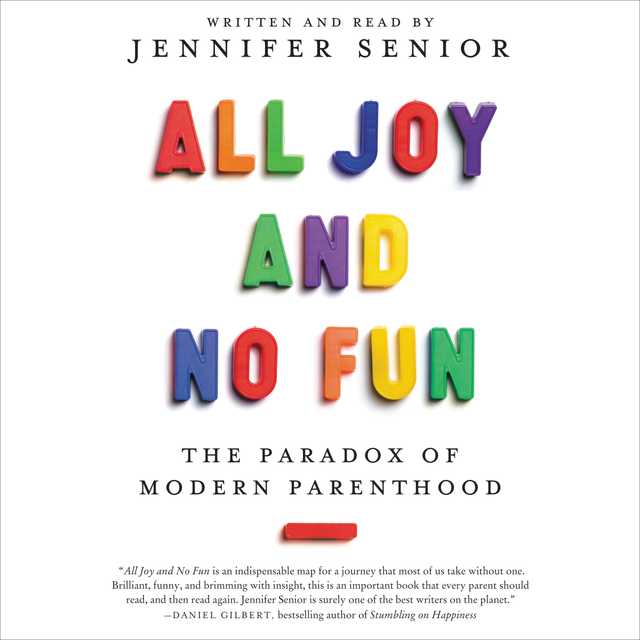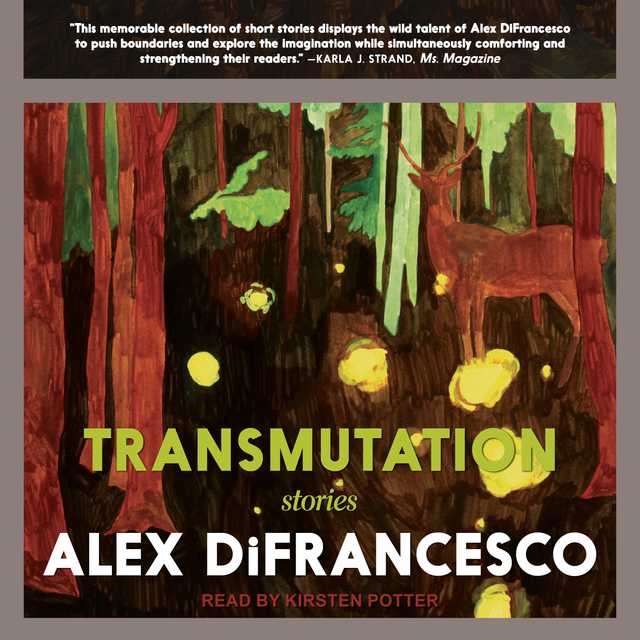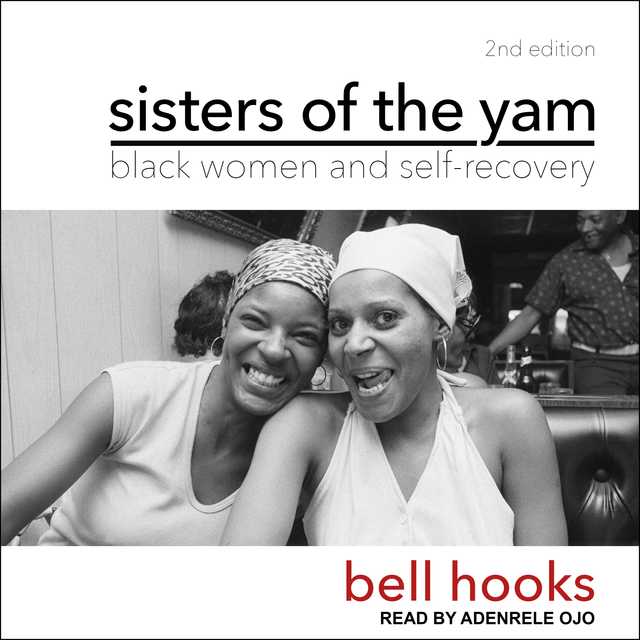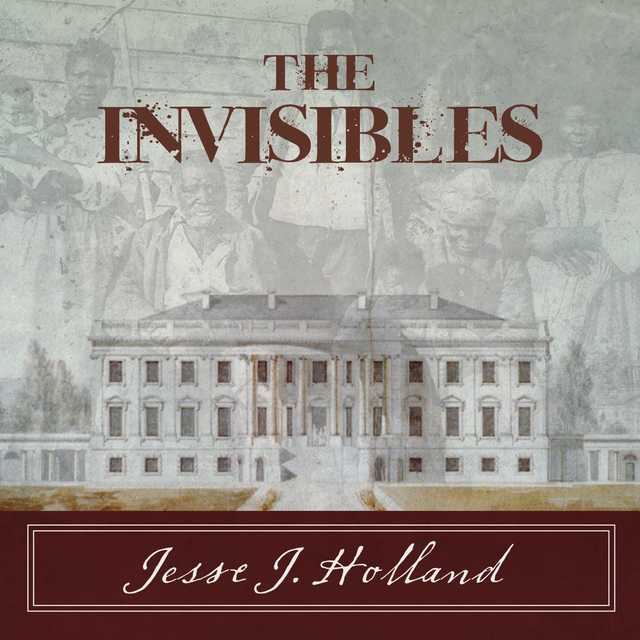All Joy and No Fun Audiobook Summary
“Salted with insights and epigrams, the book is argued with bracing honesty and flashes of authentic wisdom…[an] excellent book.” –Andrew Solomon, The New York Times Book Review
“[A] richly woven, entertaining, enlightening, wrenching and funny book.” —The Washington Post
Thousands of books have examined the effects of parents on their children. In All Joy and No Fun, award-winning journalist Jennifer Senior now asks: what are the effects of children on their parents?
In All Joy and No Fun, award-winning journalist Jennifer Senior tries to tackle this question, isolating and analyzing the many ways in which children reshape their parents’ lives, whether it’s their marriages, their jobs, their habits, their hobbies, their friendships, or their internal senses of self. She argues that changes in the last half century have radically altered the roles of today’s mothers and fathers, making their mandates at once more complex and far less clear.
Recruiting from a wide variety of sources–in history, sociology, economics, psychology, philosophy, and anthropology–she dissects both the timeless strains of parenting and the ones that are brand new, and then brings her research to life in the homes of ordinary parents around the country. The result is an unforgettable series of family portraits, starting with parents of young children and progressing to parents of teens. Through lively and accessible storytelling, Senior follows these mothers and fathers as they wrestle with some of parenthood’s deepest vexations–and luxuriate in some of its finest rewards.
Meticulously researched yet imbued with emotional intelligence, All Joy and No Fun makes us reconsider some of our culture’s most basic beliefs about parenthood, all while illuminating the profound ways children deepen and add purpose to our lives. By focusing on parenthood, rather than parenting, the book is original and essential reading for mothers and fathers of today–and tomorrow.
Other Top Audiobooks
All Joy and No Fun Audiobook Narrator
Jennifer Senior is the narrator of All Joy and No Fun audiobook that was written by Jennifer Senior
Jennifer Senior is a contributing editor at New York magazine. She lives in New York with her family.
About the Author(s) of All Joy and No Fun
Jennifer Senior is the author of All Joy and No Fun
More From the Same
- Publisher : HarperAudio
- Abraham
- American Gods [TV Tie-In]
- Dead Ringer
- House of Sand and Fog
- Prey
All Joy and No Fun Full Details
| Narrator | Jennifer Senior |
| Length | 8 hours 20 minutes |
| Author | Jennifer Senior |
| Category | |
| Publisher | HarperAudio |
| Release date | January 28, 2014 |
| ISBN | 9780062308634 |
Subjects
The publisher of the All Joy and No Fun is HarperAudio. includes the following subjects: The BISAC Subject Code is Marriage & Family, Social Science, Sociology
Additional info
The publisher of the All Joy and No Fun is HarperAudio. The imprint is HarperAudio. It is supplied by HarperAudio. The ISBN-13 is 9780062308634.
Global Availability
This book is only available in the United States.
Goodreads Reviews
Cat
February 08, 2014
I read a snippet of this book in the Wall Street Journal and found myself floored by a simple observation that the reporter drew from psychological studies: mothers tend to feel more stressed out because they are constantly multi-tasking, even when they supposedly have free time. [DISCLAIMER: I realize I will be using many untenable generalizations in this review that don't fully take into account class, profession, region, cultural background, etc. Think of them as provisional descriptions that will be useful to some people who encounter this book, including me. I'm happy to say that Senior does a very good job describing the middle-class demographic that provides her study's focus. I don't have time to be as specific here.] Men often come home on the weekends and feel delighted by and entitled to their free time, while women are still spinning their wheels about all the day-to-day maintenance that has to take place, feeling that they are failing both in child-rearing and in professional tasks. This dynamic felt very familiar to me as a working mom who watches her also working husband genuinely unwind with a combination of awe and envy. How does he just do that?? Does he not feel like he has twenty other things to do?? (As a sidenote, I felt like reading snippets of this book to my husband helped me articulate feelings and thoughts that I had not had words for before, and in that sense, it was a wonderful communication tool as well.)This book helped me put ambivalence about time management and "me" time into perspective as Senior describes the historical-cultural complications of contemporary parenthood. As the goals of child-rearing have become more inchoate, so too have the psychological demands on parents become more dislocating. Senior does an amazing job collating and interpreting psychological and sociological data, interweaving it with life narratives and interviews, *and* alluding to the philosophical and the experiential, without which any account of parenthood would be a shallow one indeed. Her prose is sharp and sterling; her approach both empathetic and undramatic. The structure of the book is strong and the chapter focuses rich: 1) the anxieties coming out of childrearing in the age of "economically useless and emotionally priceless" children 2) the complications of sharing emotional and logistical burdens within a marriage 3) the joys of the present-focused nature of early childhood 4) over-scheduled, high-achieving kids and the insanity of the schedule juggle 5) the experience of adolescence as a dramatic transition *for parents* rather than simply for their hormone-ridden children 6) joy and duty as distinguished from happiness and connected to deriving meaning from day to day life. One of my friends who is contemplating having a child said that the articles she read about this book had her feeling discouraged, but as the mother of a toddler, I felt very moved and even relieved by this book. Rather than discouraging me, it let me off the hook for frustration and worry I had not-so-secretly felt guilty for. Because of that "sing it, sister!" dimension of reading other parents' stories and also because of the book's emphasis on "joy" as opposed to "happiness," it didn't seem of a piece with the constant barrage of dour articles complaining about parents' fatigue and unhappiness. Senior's book put particular sources of frustrations into helpful contexts. For example, in addressing professional parents, Senior looks to the theory of "flow" as a source of pleasure (completing tasks with a clear sense of rules and a desired outcome and losing your sense of yourself in the pleasure of the process), and she points out that while intellectual/informational/bureaucratic work can provide that flow, child-rearing on the ground doesn't often do that: the rules are unclear, the outcomes even more so, and the parent must constantly define the rules and cope with interruptions and curveballs.This observation made me feel so much better about the fact that I often enjoy my hours of writing and teaching more than I enjoy my hours of supposedly quality time with my daughter. Instead of feeling like "Crap, my value system is a mess!" or "How can I not appreciate my beloved daughter enough?", I had a "Eureka! Of course!" moment reading that section about flow. Writing allows me to pursue a goal that I understand, and I can lose myself in that process. When I'm trying to stop my daughter from writing all over the walls or trying to eat a shoe, it's not as Zen a process. It's also hard to feel what the "win" was in that moment. (Word counts are easier to assess than the overall value of togetherness.)This is not an advice book on parenting (thank God! there are enough of those in the world, most of them more damaging than helpful), but it actually has already had some impact on my experience of parenting. Ironically, once I begin to let go of the idea that I'm feeling things wrong, I am able to enjoy myself more. Also, I recognize that some of my sources of stress (multi-tasking, rule-setting, task-sharing) are shared by *many women* of my generation. I underlined more of this book than I left untouched. And the wonderful thing is that while Senior describes all of this anxiety and frustration, she also describes the beauty of duty, the limitation of "happiness" imagined as temporary excitation or total autonomy, and the life-changing wonder of having a child. This is a book that made me say "Aha! That's me!" and also made me well up with tears, feeling so fortunate to have this confusing, demanding, joyful experience of motherhood. I know I will turn back to this book many times in the coming years.
Catherine
October 22, 2021
Have you ever read a book that made you want to stand up and shout, "YES! THAT'S EXACTLY WHAT I WAS THINKING!" This is one hundred percent that sort of book. Jennifer Senior takes an unabashed and thoroughly researched look at all that parenting is--and isn't--for the parents of today, tackling everything from the early loss of autonomy when you first have a child, to the marital discord that often follows, to the conflict that rises as children pass from early years into adolescence and what parents are left with once they leave the roost. She also brings in the social and cultural connotations of parenting and how things have changed over time, where children once were essentially bred to carry on the family name and pass along property and utilized for their economic worth, to today where they are "economically worthless but emotionally priceless." This leaves parents beholden to creating a certain experience for their children to mold them into the young people they should be, putting them in all of the right activities and making sure their homework is top of the class. She touches on the loneliness moms often feel, how the division of labor between husbands and wives is always a sore spot with mothers feeling that they 'do more' in terms of child care, even though husbands of today are more involved than they were in the past, among other complexities of parenting and how the role itself has changed over time.As a new mom, there have been so many instances where certain feelings about the institution of parenthood have felt 'wrong', made me feel guilty, or have seemed unfair to my wonderful son. After reading Senior's words, however, full of interviews with many, many parents in different circumstances, what I've come to learn is that some of the more unfulfilling aspects of parenthood are not only incredibly common, but have been shaped by our society as a whole. For instance, the fact that the US doesn't offer any guaranteed paid leave to new moms shows the emphasis we place on production and capitalism rather than the strength of the family unit. Moms are supposed to 'have it all' and be doing it all, but as moms can attest during this era of COVID, trying to effectively "work from home" while caring for children is not only difficult, but can be close to impossible. If the work/home life balance no longer exists, is your child OR your job getting the best of you? And where does that leave any time to explore who you are as a growing and ever-changing adult?This book was eye-opening, well-researched, and emotionally intelligent all at once. Senior does not sugarcoat reality, but rather gives her reader a chance to reflect on who they are as parents, would-be parents, or perhaps just as adults in general. After exploring the trials and tribulations of parenthood throughout so much of the text, she ends with a hopeful message that focuses on the joy itself, and our collective reasons for having children in the first place: We do not care for them because we love them: we love them because we care for them.4.5 ⭐
Zach
September 08, 2014
I'm expecting my first child in January, a daughter, and like any expectant first-time parent I've been becoming increasingly concerned with how I will manage this sea change in my life. My wife has been busy reading every parenting philosophy book under the sun, getting lots of starkly conflicting advice about how to produce the best possible human being. Meanwhile I have always had a pretty laisse faire attitude to parenting: I think the kid's future is mostly written in her DNA and her peer group; that she'll succeed or fail largely in spite of any optimization we might attempt; and I view our main job as keeping her alive long enough to realize that future. I'm much more concerned, somewhat selfishly, about how the transition to parenthood will affect me, my wife, and our relationship. Tellingly, of the handful of parenting books my wife has read since she became pregnant, not a single one does more than briefly touch upon how children affect their parents. As far as modern parenting philosophy is concerned, it's not just that the parents' feelings matter less than the children's -- the parents don't even rate mentioning.All Joy and No Fun attempts to fill in this vast chasm in popular thought about raising children, and does a pretty decent job. Caveat: I don't yet know, personally, what it's like to be a parent, and as I am reminded fiercely by friends who already have kids, this renders my opinions invalid. However, even a clumsy attempt at the topic would have been a good start, and I found the author's approach, drawing on sociological research as well as case studies, interviews, and a century of literature on the topic of raising children, to be very enlightening. She states in the introduction that her book isn't intended as parenting advice, but it's difficult not to read between the lines a bit here and there.For example, when you ask youngish children about their parents, only 15% say that they wish their mothers and fathers spent more time with them. In contrast, a full third said they wished their mother wasn't as stressed out. If these two data points don't comprise a ringing denouncement of hyper-involved parenting, I'm not sure what would. In my view, if there is parenting advice to be had in this book (and I think the author's slant bleeds through more than she might think), it would be to leave the kids alone so that you can enjoy your own life. We'll return to that sentiment in a bit.Senior divides the book into six sections, broken down by life stage of the children and which area of the parents' lives they're currently ruining. And ruin it they do! Sadly, all the sociological evidence indicates that having children is intensely stressful, both to the individual parents and to their relationship. Parents consistently report lower rates of happiness and well-being on various metrics than their childless counterparts, and the age of their children is the best predictor of this decrease, with things being especially bad around the age of three. Some of the reasons for the decline are obvious, such as sleep debt, decreased free time, decreased couple time, and strained finances. Others are more subtle, such as the children themselves directly creating arguments and conflict. Each family seems to have a slightly different story, but some broad repeated themes are clear.First, parenthood is subjectively harder for mothers. This is true regardless of whether a mother works outside the home, but is especially true of working moms, and even more true of single moms. The main cause in this discrepancy seems to be (I'm editorializing a bit here, but not a lot) that mothers, more than fathers, seem unwilling to set boundaries with their children to make time for themselves. As a result, even when couples attempt to split domestic labor 50-50, and even when they empirically succeed in this division (verified by sociological studies) for all domestic chores except child care, mothers still spend almost twice as much time as fathers actively taking care of their children. The author seems to suggest that this has everything to do with the attitudes the two genders bring to the task. Men, more than women, are able to view parenting as a job with discrete boundaries and goals, whereas for mothers, enough is never enough: mothers can't seem to give themselves permission to use their free time for any activity other than more parenting, and the paroxysms of guilt are especially pronounced in working mothers, who already feel like they abandon their kids every time they leave for their job. This imbalance in turn breeds resentment of fathers by mothers, even fathers who are very engaged (and light years ahead of their gender roles from a generation or two ago). Mothers, having set the bar impossibly high for themselves, get upset when their partners fail to clear it as well, and by an even greater margin.Second, relative to other cultures and previous moments in history, American middle-class parents are involved in their children's lives to an astonishing degree. You can see this reflected in the language we use to talk about the tasks surrounding child care. Wives who didn't work outside the home a generation ago were called "housewives" and later "home makers," reflecting the fact that the primary product of their domestic labors was the living space: they made a nice place for the family to live. Today wives in the same situation are called "stay-at-home moms": the focus of their labor is their children. Also notice the shift in title from "wife" to "home" to "mom," showing the gradual change in these women's primary obligations. Similarly, the verb "to parent" didn't appear in print until after World War II. Parents today (mothers and fathers, but especially mothers) not only spend more time with their children than in decades past, but the nature of time spent has changed dramatically as well. Childcare has shifted from a mostly supervisory and care-taking role to one of active engagement, where parents and children both expect that parents will entertain and cultivate their children on a near constant basis. This is true throughout early childhood, until the school years, when the focus shifts somewhat to structured activities outside the home, which again are attended at record-shattering levels by middle-class children. This phenomenon, the so-called "overscheduled child," has been reported on periodically over the last several decades. But interestingly, these analyses tend to focus exclusively on what effect this arrangement might have on the children -- the parents are completely erased from the equation. But parents are affected, profoundly so: relative to their peers from the 70s, parents today spend significantly less time alone and as a couple, and report lower levels of happiness at all times. There's an obvious comparison to be made to French mothers thanks to the wildly popular Bringing up Bebe, one of the leading texts in the cultural backlash to parental hyper-involvement. French mothers spend less time with their children (thanks largely to state-sponsored daycare) and report higher levels of happiness for it.Finally, the author devotes some time speculating to the broad historical and economic reasons that brought American parents to the current state of affairs. Childhood as a concept is a modern invention dating to about the Civil War, and adolescence even more modern, not existing before World War II. Today you hear the first rumblings of "emerging adulthood," which extends the concept of people as mostly-useless non-adults even farther out, into the mid-twenties. It's easy to forget that not long ago in our shared history, children had economic value first on the farm and then in factories from a young age, and teenage boys often contributed more to the family till than their aging fathers. Today, to employ a quote the author trots out several times, children are "economically worthless but emotionally priceless." This shift in attitudes toward young people as being in need of extended protection and shelter from the world of adults, as well as economic trends that resulted in a frankly obscene level of education to secure a middle-class life, together can mostly explain today's unprecedentedly high level of parental investment.For the record, I do plan to read parenting books that focus on the children instead of the parents (i.e. all the rest of them). And I plan to be a dedicated, involved father in the life of my daughter. But I also hold the somewhat heretical view that my own personal happiness, the happiness of my wife, and the quality of our relationship with each other is vitally important -- at least as important as the child's happiness -- not only for our own sake but also for our children's. Some dip in personal happiness associated with having children seems to be unavoidable, for example when dealing with sleep debt while caring for a young child. But this book offers a modern, data-driven guide to what attitudes and practices are the most likely to make one miserable, and offers suggestions for a way around the worst of it, even if you do have to read between the lines to see it.
Ann
February 02, 2014
There's been a lot of hype lately about studies that show how parents are unhappier than non-parents. I've been really surprised by those findings because my life as a parent is so fulfilling, and while there is tedium and drudgery in some of the day to day, there's a lot of joy and meaning that I wouldn't trade for anything in the world. And I don't know any parents who want their old lives back. This book tackles modern parenthood and comes to the same conclusion. It explores why modern parenthood is so difficult (isolating, careening towards uncertain futures, etc.) but it's also transcendental in ways that sociology can't measure. Having kids is well worth it and this book is a great read.
Rebecca
May 13, 2015
I started this book with my defenses up. I was expecting to have to defend parenthood as being much more meaningful and important than my personal "happiness", that life is not some continuous existential experience whose only goal is to be "happy" every moment. I was pleasantly surprised with the d
Ciara
February 17, 2014
hmmm. i am of two minds about this book. on the one hand, i zipped through it in about two days, it really captured my attention, i related to a lot of it (mostly about having little kids, obviously, since i have but one child right now & she's a toddler), & i really liked the book at the time. my partner read it too & on valentine's day, we convened a two-person book club after our daughter went to sleep so we could discuss it. which brings me to the other hand.we both liked the book, but we had very little to discuss. the book didn't really tell me anything i hadn't already read or didn't already know just from being a parent myself. i mean, what were the big revelations in the book?* parenting is a real pain in the ass sometimes. but it also has its transcendent moments of joy.-- no kidding. wrangling a kid is a ton of work. it's only 1 in the afternoon & already today i've had to take at least five random pieces of paper away from ramona because she was eating them (where does she even FIND them?), i'm washing my third load of laundry, i had to stop the cat from biting ramona's head during a diaper change, & i had to move at the speed of light to prevent ramona from dumping an entire cup of coffee over her head. but my heart always melts when she looks up at me & says, "mama." * parenting does not lend itself to "flow".-- also, no kidding. i can totally lose myself in a sewing project or a book, but after the first five minutes, every additional minute spent pretending to let ramona feed me her fake food or building block towers for her to knock down feels like a lifetime.* mothers tend to do more multi-tasking, which is stressful & exhausting.-- yeah. i stay at home with ramona & sometimes feel jealous of the way my partner can so willingly abandon whatever he's doing when he's home in order to read ramona a story or give her a piggyback ride. i sometimes have to force myself to stop what i'm doing to spend some time with her & it makes me feel like a shitty mom. but during our two-person book club, he explained that he gets forty hours a week outside the house to work uninterrupted, so it's easier to focus just on her when he's at home. as where ALL my time is multi-tasking time. even now, i am writing this while she naps so i'm not doing computer stuff while she's awake & wanting to hang out, & also so she's not tempted to "play" with my computer (which she does by banging on it & trying to bite it). * the illusion of equality matters more to the satisfaction in a relationship than actual parity in tasks.-- i could have told you this. jared & i split baby care & household chores fairly evenly (for example, i watch the baby while he's at work, but he does extra baby care on weekends to give me a break; i do all the laundry & he does all the cooking; etc). but if he falls down on one thing i ask him to do, i start feeling like cinderella. a very wrathful cinderella. i can't even tell you how many arguments we've had about whether or not pizza boxes go in the recycling. (they don't, but jared can't seem to remember that.)blah blah blah. the chapter on adolescence was especially interesting/terrifying, since that is completely uncharted territory for us. i mean, i'm an adult woman & teens kind of scare me. i can't believe i'm going to be living with one in twelve years. i don't know. i'm glad this book exists & i'm glad i read it. i might ask if my playgroup wants to read it & have a little discussion about it. maybe we will have more to talk about than jared & i did.
Dawn
December 30, 2014
I got three main things out of this book. A friend put my thoughts about this book into her own review, so I'll start with that.1. Parenting has always sucked major donkey balls, but our generation is more miserable than previous generations because we have some goofy idea that parenting isn't supposed to suck.2. You know how, at the end of a family vacation, one parent says, "I'm never going anywhere with you people ever again!" and then three months later, they're planning the next family getaway? Like they don't realize that the actual experience of the vacation is different than the experience of remembering the vacation? Well, it turns out that's a real phenomenon. I wasn't just imagining it; family vacations are for making memories, because the actual experience is mostly worse than a weeklong trip to the dentist sans laughing gas. Plus, I am never going anywhere with my husband and daughter ever again!3. You don't love your kids because they are precious gifts from your favorite deity; you love them because you care for them. The act of caring creates the joy of being a parent.I gave this book 5 stars because I feel it gave me permission to admit that being a parent is mostly hard, unrewarding, unfun work. I'd recommend this book coupled with a viewing of The Princess Bride , to remind us all that life was never intended to be fair, but amidst all the crap (literal crap--we're talking about parenting here), there is still a lot of beauty. If you can get your kids to sit down and shut up long enough to watch The Princess Bride with you, even better. If you read the book with them, bonus points for you.
Deanna
October 30, 2013
I couldn't put this book down. As a working mom with two boys, I related to the sentiments expressed by all of the parents chronicled within the book and could feel the kids' greasy hands and the moms' well worn sweats, the writing was that good. And of course I fell in love with Sharon. But as a researcher, what I loved most about All Joy and No Fun was how steeped it was in truth and supporting, sometimes conflicting, research. I felt as if I was on an intellectual pursuit yet enjoying an utterly relatable journey. Thank you for this gift. I hope everyone I know reads it. I plan to make sure they do. 5+ stars. Best book of the year.
Kay
July 01, 2017
Well-reported, well-researched, and intellectually curious about the philosophy parenthood, this book is basically catnip for me. Jen Senior applies adept reading of studies about childhood and parenthood (and its effects on marriage) and synthesizes it all with some anecdotal evidence from real couples, mostly in Minnesota. The reason for this, I suspect, is because Minnesota is a state with a firm commitment to early childhood education. She meets parents at ECFE, a program that I remember attending when I was a kid. But she doesn't do this to dispense advice or offer parents a guidebook. Instead what she does is try to get at a very difficult thing about entering parenthood: Why do we do it even though it sometimes makes us miserable? The answers are not easy. She looks at many stages of childhood — from the challenging nature of toddlerhood to the emotional distress of raising teenagers — and how it affects parents as humans. This shouldn't be revelatory. In many ways, it is not. But when you look at the heap of books for parents, it is certainly unusual.I'm a new parent, and I often find myself in the complicated identity changes that come with the role. I am still the same person I was, but this experience has totally changed me. I'm also forced to re-evaluate all those things I thought I would "never" do on a near-daily basis. I'm looking at you, chapter four, which details the frenzied pace at which parents shove their children into enrichment programs and after-school activities. Senior's book, in many ways, takes that identity crisis seriously. She doesn't offer solutions, but she does offer diagnosis. She points to the fact that, even though women are doing less housework, they are still doing more parenting. It's also not just about parenting; it's about the placement of identity. Terrifyingly, she points to one study that shows more marriages are doomed when there's a greater difference in how highly the two partners place parenthood in their ranking of identities (women almost always rank motherhood higher than men rank fatherhood).All this is to say that this book, though it certainly isn't comprehensive — she's open from the get-go that this book applies to middle class, mostly partnered parents — it does a great job of helping me think in a rational ways about some of the hard parts of parenting. The last chapter, touchingly, talks about the ways in which children bring true meaning to our lives in a way that isn't always happy, but it is joyful. Spoiler, I guess. Anyway, I am perhaps biased because I am the target audience for this book, but I thoroughly enjoyed it.
Leah
February 24, 2014
I decided to start this book while on deadline, thinking it was the kind of book where I would have no problem reading a chapter at a time in between work. Ha! I finished it in less than 24 hours and was completely engrossed.This is a study of modern parenting, and I'm guessing the main audience for the book is parents -- there's nothing there that is particularly proven or airtight, so what made the book so compelling for me was how well it corresponded to my own experiences and those of most of my friends. The chapter on adolescence, on the other hand, was the slowest part of the book for me, and I'm guessing that's because I don't have adolescent children yet - I found myself skeptical of a lot of her statements and claims, which wasn't true when I was reading the other chapters. (And I suspect might not have been true if my kids were teenagers).This is a sociology study, not a how-to-guide; even so, I think most parents will find it helpful, both in the "I'm not alone" sense, and because understanding something can help you tackle it better. Also, despite its focus on the problems of parenthood, the author takes care to make it clear that sociology has its limits; "Meaning and joy have a way of slipping through the sieve of social science. The vocabulary for aggravation is large. The vocabulary for transcendence is more elusive."Some reviews have described this book as depressing, but really, if you're a parent, the depressing parts are nothing you didn't already know, though you might know it a bit more starkly now (toddlers obey commands only 60% of the time? Well, it's nice to put a percentage to it). For me, this book was equal parts humorous, comforting, fascinating, and -- especially in the last chapter -- full of joy.
Frequently asked questions
Listening to audiobooks not only easy, it is also very convenient. You can listen to audiobooks on almost every device. From your laptop to your smart phone or even a smart speaker like Apple HomePod or even Alexa. Here’s how you can get started listening to audiobooks.
- 1. Download your favorite audiobook app such as Speechify.
- 2. Sign up for an account.
- 3. Browse the library for the best audiobooks and select the first one for free
- 4. Download the audiobook file to your device
- 5. Open the Speechify audiobook app and select the audiobook you want to listen to.
- 6. Adjust the playback speed and other settings to your preference.
- 7. Press play and enjoy!
While you can listen to the bestsellers on almost any device, and preferences may vary, generally smart phones are offer the most convenience factor. You could be working out, grocery shopping, or even watching your dog in the dog park on a Saturday morning.
However, most audiobook apps work across multiple devices so you can pick up that riveting new Stephen King book you started at the dog park, back on your laptop when you get back home.
Speechify is one of the best apps for audiobooks. The pricing structure is the most competitive in the market and the app is easy to use. It features the best sellers and award winning authors. Listen to your favorite books or discover new ones and listen to real voice actors read to you. Getting started is easy, the first book is free.
Research showcasing the brain health benefits of reading on a regular basis is wide-ranging and undeniable. However, research comparing the benefits of reading vs listening is much more sparse. According to professor of psychology and author Dr. Kristen Willeumier, though, there is good reason to believe that the reading experience provided by audiobooks offers many of the same brain benefits as reading a physical book.
Audiobooks are recordings of books that are read aloud by a professional voice actor. The recordings are typically available for purchase and download in digital formats such as MP3, WMA, or AAC. They can also be streamed from online services like Speechify, Audible, AppleBooks, or Spotify.
You simply download the app onto your smart phone, create your account, and in Speechify, you can choose your first book, from our vast library of best-sellers and classics, to read for free.
Audiobooks, like real books can add up over time. Here’s where you can listen to audiobooks for free. Speechify let’s you read your first best seller for free. Apart from that, we have a vast selection of free audiobooks that you can enjoy. Get the same rich experience no matter if the book was free or not.
It depends. Yes, there are free audiobooks and paid audiobooks. Speechify offers a blend of both!
It varies. The easiest way depends on a few things. The app and service you use, which device, and platform. Speechify is the easiest way to listen to audiobooks. Downloading the app is quick. It is not a large app and does not eat up space on your iPhone or Android device.
Listening to audiobooks on your smart phone, with Speechify, is the easiest way to listen to audiobooks.






























